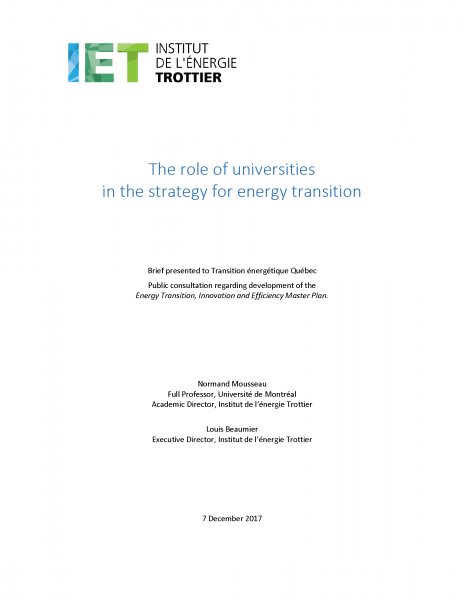This brief was filed by Institut de l’énergie Trottier (IET) for the consultation held by Transition énergétique Québec (TEQ) in preparation for the formulation of its first master plan.
Its aims are to: (a) stress the academic community’s potential for knowledge and analysis in support of a societal transformation as far-reaching as the one that TEQ is called upon to bring about in the coming decades; (b) underline the supporting role that academics play in countries that make successful progress towards the transition; and (c) put forward a strategy to enable Québec to attain the energy objectives of its Strategic Plan 2030, especially as regards reducing greenhouse gas emissions, while safeguarding its economic and social development.
More specifically, the proposal presented by IET elaborates on three of the functions defined in section 5 of the Act respecting Transition énergétique Québec (original text in French):
Section 5: Within the scope of its mission, Transition énergétique Québec may, in particular:
[…]
(6) prepare reports on energy in Québec and benchmarking studies on best practices with respect to energy consumption and production;
(7) support research and development in the energy sector;
(8) in collaboration with the main stakeholders in research and industry, establish a list of research subjects to prioritize[.]
The transition demands that energy be used more efficiently, of course, but by virtue of its scope, it requires a far more profound transformation of Québec society: beyond energy efficiency, energy sources must be changed, processes must be transformed, service offerings and consumption patterns must be altered, infrastructures must be overhauled and land occupancy must be adapted. To fulfil its mandate, TEQ must build the three above functions into all of its actions and address them in a coordinated manner in order to optimize transition efforts and maximize the ensuing environmental, social and economic benefits.
TEQ must therefore very quickly develop a close working relationship with universities in order to:
- contribute to the development of processes and technologies that will enable energy to be produced and used more efficiently and, above all, better services to be provided;
- support the development of better performance indicators;
- generate scenarios and assess the costs and possible benefits of various actions by developing and using sophisticated modelling and analysis tools.

